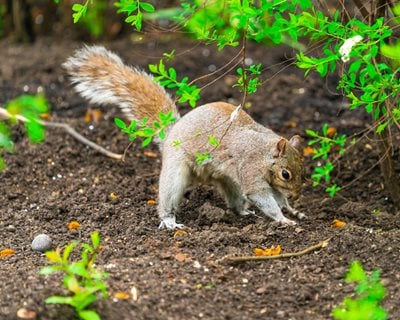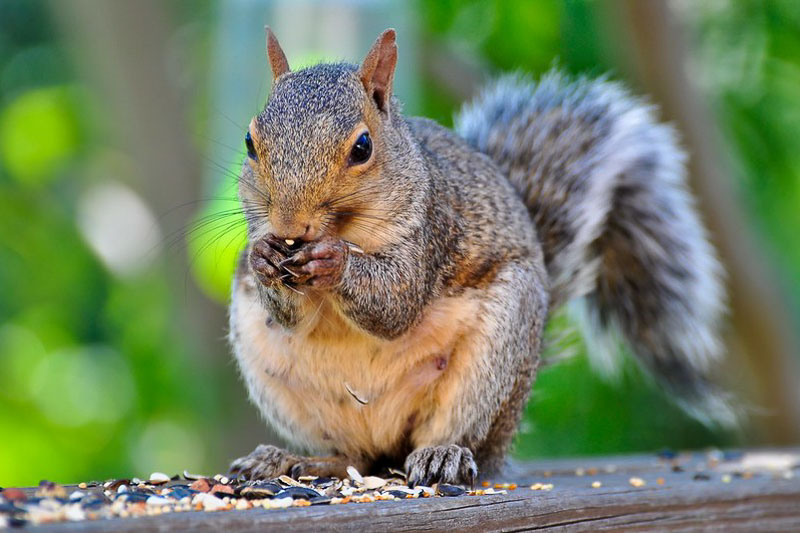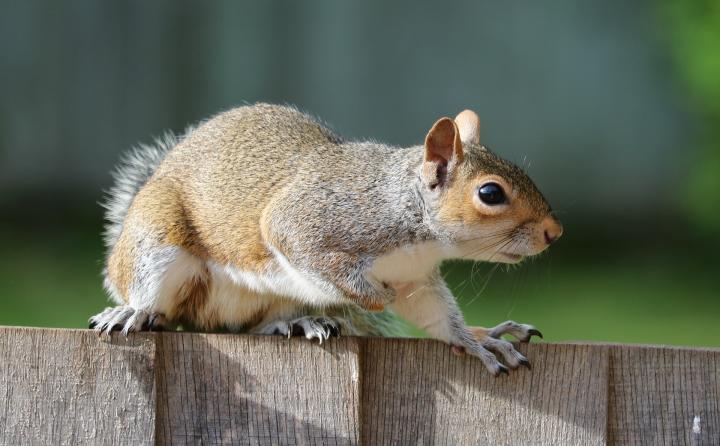As a gardener, few things are more frustrating than putting in all the hard work to grow beautiful flowers, fruits, and vegetables only to have squirrels ransack your garden and destroy your crops. These bushy-tailed rodents use their sharp claws and teeth to dig up newly planted seeds, gnaw on ripening produce, and ravage tender seedlings.
Squirrels can be cute to watch as they scamper around your yard. But when they invade your garden, it’s time to take action to protect your plants. Repellents are an effective and humane way to deter squirrels and prevent damage. But with so many products available, how do you choose an effective squirrel repellent? And what exactly makes them work?
Why Squirrels are Drawn to Gardens

Before learning about repellents, it helps to understand what attracts squirrels to gardens in the first place. Their key motivations are food and shelter.
Squirrels are opportunistic feeders who eat various fruits, vegetables, seeds, nuts, flowers, and even newly sprouted plants. Your garden is an irresistible buffet to them. Certain produce like tomatoes, corn, strawberries, and squash are squirrel favorites.
In addition to food, squirrels seek places to build nests for shelter and raising young. The soft soil, twigs, and leaves in garden beds or pots are appealing nesting sites. They’ll also nest in trees and structures around the garden.
By diminishing the food reward and appeal of shelter, repellents make gardens less enticing places for squirrels to feed and dwell.
Types of Squirrel Repellents

There are several main categories of squirrel repellents on the market:
Chemical Repellents
Chemical repellents use ingredients like capsaicin from hot peppers or oil of black pepper that irritate squirrels’ respiratory tracts and skin. When squirrels touch, inhale, or ingest these irritants, it triggers discomfort and deters them from lingering.
Popular chemical repellent ingredients:
- Capsaicin – Found in hot peppers like jalapeños and cayenne. Capsaicin oils will burn squirrels’ mouths and noses.
- Piperine – The chemical compound that gives black pepper its heat and pungency. Oil of black pepper extract is often used in repellents.
- Allyl isothiocyanate – Produced naturally by mustard plants. It has a strong, pungent odor that squirrels avoid.
- Ammonium soaps – Give repellents a strong, unpleasant smell. These fatty acid salts disrupt squirrels’ ability to detect natural food odors.
- Denatonium saccharide is an extremely bitter synthetic compound used to deter chewing and taste.
Natural Repellents
Instead of synthetic chemicals, natural repellents rely on substances found in nature to deter squirrels:
- Hot pepper – Cayenne, jalapeño, habanero, etc. Pureed into a spray or flour.
- Black pepper – Freshly ground black peppercorns have a strong smell and flavor.
- Garlic, onions, horseradish – Smelly bulbs overwhelm squirrels’ sensitive noses.
- Citrus peels – Dogs hate citrus smell. Oranges, lemons, limes, grapefruit.
- Eucalyptus, mint, lavender, thyme – Strong herbal scents.
- Predator urine – Urine from foxes, coyotes, mountain lions, bobcats, dogs signals danger.
- Blood meal – Dried animal blood gives the scent of death and predators.
- Putrescent egg solids – Rotten eggs have an unpleasant sulfur odor.
Physical Repellents
Physical repellents create discomfort or obstructions to repel squirrels:
- Sharp polypropylene granules – Like grape-sized gravel. Pokes paws and bodies.
- Prickle strips – Plastic mats or tubes with upright spikes. Discourages walking.
- Electric shock – Mild electric pulse zaps squirrels. Used in live traps.
- Motion-activated sprinklers – Sudden water spray frightens intruders.
- Ultrasonic devices – Emits high-pitched sounds only heard by squirrels.
Combination Repellents
Many popular squirrel repellents contain a blend of ingredients from multiple categories for enhanced effectiveness:
- Castor oil + capsaicin + pepper – Natural oil sticks to fur. Irritants deter contact.
- Mint oil + garlic + eggs – Strong scents, tastes, and textures overwhelm squirrels.
- Ammonium soaps + horseradish + prickly pear – Unpleasant odors, tastes, and prickly feel.
- Peppermint oil + chili powder + denatonium – Smell, taste, touch deterrents.
Look for combination products that attack squirrels’ senses of smell, taste, and touch for best results.
How Squirrel Repellents Work

Now that you know the main types of repellents, how exactly do these products work to scare away squirrels? The key mechanisms are:
Sensory Disruption
Squirrels rely heavily on their senses of smell, taste, and touch to assess their environment. Strong odors, flavors, and textures overwhelm these senses and make areas unpleasant.
Smelly repellents like garlic, predator urine, or rotten eggs assault squirrels’ sensitive noses and mask inviting food smells. Bitter chemicals interrupt their taste sensations. Prickly textures hurt their paws and bodies. This sensory confusion deters lingering in treated areas.
Irritation and Discomfort
Ingredients like capsaicin, piperine, and soap-based ammonium disrupt neurons in squirrels’ noses, mouths, and paws. When ingested or touched, these chemicals excite nerve receptors that register as irritation, burning, or pain.
Squirrels quickly learn to associate this discomfort with treated plants. The irritation triggers an avoidance response so squirrels steer clear.
Fear and Anxiety
Certain repellents tap into squirrels’ innate fears. The scent of predator urine or blood meal raises alarms that a natural enemy is near.
Sudden sounds and motion from ultrasonic devices or motion-activated sprinklers startle and scare squirrels away. They become anxious being near plants associated with these frights.
Deterrence Through Conditioning
Repellents work by teaching squirrels to dislike and avoid treated areas through negative experiences – irritation, confusion, fear. Like training a pet.
With repeated exposure over days or weeks, squirrels learn plants and boundaries treated with repellents predict bad outcomes. This conditioning results in squirrels bypassing unpleasant areas to seek food and shelter elsewhere.
Tips for Using Squirrel Repellents Effectively

Now that you understand the science behind squirrel repellents, let’s look at some tips for using them effectively:
Start Early
It’s best to apply repellents proactively before squirrels become established raiders in your garden. Starting early makes it easier to condition squirrels to avoid treated areas from the outset.
Use Multiple Repellents
Varying repellents with different active ingredients keeps squirrels guessing. Switching between smells, flavors, and textures heightens the sensory disruption and deterrent effects.
Reapply Frequently
Don’t expect a single application of repellent to work for long. Reapply every few days to account for fading smells, weather, etc. Frequent reapplication strengthens the negative associations.
Treat Plants and Perimeters
Treat not just vulnerable plants but garden perimeters too. Border patrol! This blocks entry and teaches squirrels the whole area is unpleasant.
Check Ingredients
Ensure repellents don’t contain hazardous chemicals. Skip mothball-based products. Stick to plant-derived or natural ingredients for safety.
Follow Directions
Carefully follow label instructions for best results. Pay attention to application rates, frequency, placement, etc. More is not always better.
Remove Food Temptations
Eliminating or tightly sealing any outdoor food sources like fallen fruit, nuts, and seeds deprives squirrels of rewards. This maximizes repellents’ effects.
When Squirrel Repellents Fail
Repellents are very effective deterrents for most squirrels. But some particularly stubborn bushy-tails may persist despite your best efforts. Reasons why repellents occasionally fail include:
Desensitization
With prolonged exposure, some squirrels may become desensitized to even nasty smells, tastes, and textures. Like people living near a sewage plant — they acclimate. Varying repellents helps prevent this tolerance.
Desperation
In times of extreme food shortage, squirrels become less choosy and more tolerant of repellents to secure scarce resources. Eliminating food rewards reduces this motivation.
Motherly Love
When female squirrels have dependent young to provide for, their maternal drive overcomes avoidance of repellents. Try sealing entry points to dens.
Individual Personality
Some squirrels are just bolder and more daring than others. These brazen bandits laugh in the face of repellents. Live trapping and relocating may be necessary.
Improper Use
Repellents fail when not applied thoroughly, frequently enough, or according to label directions. User error! Follow instructions carefully.
Be patient and persistent if squirrels initially defy repellents. Combining repellent products, removing food sources, and exclusion tactics will ultimately win.
Squirrel Repellents: The Verdict
Squirrel repellents won’t guarantee a completely squirrel-free garden. But when used properly, they are an extremely effective first line of defense for protecting your plants.
Repellents create a humane barrier by making plants irritating, confusing, or frightening. This deters squirrels from even approaching and sampling plants, avoiding damage.
Always read labels thoroughly and monitor for any hazards before using chemical repellents. Start with natural ingredients like hot peppers, predator urine, garlic oil, or herbal scents for a non-toxic approach.
Be vigilant in reapplying repellents before rain, irrigation, or lawnmowing wash them away. Vary products and target both plants and perimeter areas. Remove any foods tempting squirrels to push past the repellents.
With patience and persistence, squirrel repellents can condition squirrels to lose their appetite for your garden goodies. That lets you reap the fruits and veggies of your labor, not the squirrels!
Frequently Asked Questions
How long do squirrel repellents last?
Most repellents are effective for 5-7 days before needing reapplication. Weather, irrigation, and disturbance affect longevity. Reapply more frequently for severe squirrel pressure.
Are electronic ultrasonic repellers effective?
Ultrasonic devices have limited success. Squirrels may adapt or avoid treated zones but not leave the area. It is better for small spaces than whole gardens.
What plants do squirrels hate to smell?
Squirrels detest strong scents of garlic, onions, chili peppers, mint, citrus peels. Interplant or spray these smells as repellents.
Can I make homemade squirrel repellent?
Yes. Simple DIY repellents include chili pepper flakes, garlic oil, predator urine, and ammonia-soaked rags. Reapply frequently for best results.
Are mothballs effective for repelling squirrels?
No. Mothballs (naphthalene) are hazardous to humans and pets. They also have limited effectiveness against squirrels. Don’t use them.
Conclusion
Squirrel repellents are indispensable tools for any gardener plagued by these pesky rodents. Various natural or chemical irritants smells, and textures make plants unpleasant for squirrels but safe for people when used properly. The benefits of container gardening extend beyond cultivating plants; The benefits of container gardening extend beyond cultivating plants; by strategically applying repellents throughout the garden and perimeter, you not only establish protective barriers but also create a harmonious space where plants thrive, free from the persistent interference of squirrels conditioned to seek their food and fun elsewhere.











